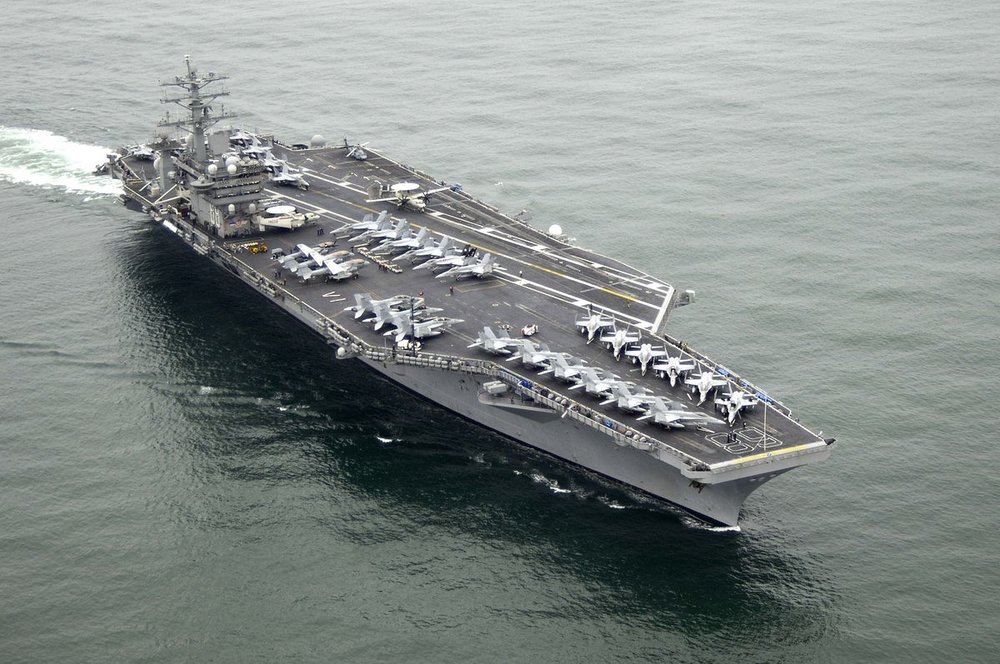Iran’s IRGC: U.S. Navy helicopter bore down on boat 'provocatively'

TEHRAN – The Islamic Revolution Guards Corps navy said a U.S. Navy helicopter hovered over one of its patrol boats in the Persian Gulf on Friday afternoon, a move it called a “provocative and unprofessional”.
"At 4 pm (11:30 GMT) on Friday, the supercarrier USS Nimitz and its accompanying warship, while being monitored by the Guards' frigates, flew a helicopter near the Resalat oil and gas platform and approached the force's ships," the statement added.
“In a provocative and unprofessional move, the Americans warned the Zulfiqar flotilla by firing flares, but the flotilla, without paying attention to the unconventional and unusual behavior of the American ships, continued its mission and after a short period of time the American aircraft carrier and its accompanying warship left the region.”
The development follows a Tuesday incident during which the U.S. Navy’s patrol craft Thunderbolt fired warning shots in front of the Iranian vessel after it had reportedly ignored radio calls, flares and the ship's whistle.
The IRGC announced late on Tuesday that one of its patrol ships had neutralized the act, saying its boat paid no attention and continued with its mission and after a while the U.S. vessel left the area.
“Days after an American ship fired two warning shots in front of a Revolutionary Guards navy boat in the northern Persian Gulf, American ships committed a similar act the Persian Gulf’s middle zone,” said a statement by the IRGC on Saturday.
The Friday confrontation capped a turbulent week of vicious barbs traded between Tehran and Washington, one day after Iran tested a satellite-carrying rocket and on the same day Washington slapped new sanctions on six subsidiaries of a company key to Iran's ballistic missile program over the test launch. The Friday confrontation capped a turbulent week of vicious barbs traded between Tehran and Washington, one day after Iran tested a satellite-carrying rocket and on the same day Washington slapped new sanctions on six subsidiaries of a company key to Iran's ballistic missile program over the test launch.
The Trump administration’s harsh rhetoric toward Tehran has exacerbated tension between the two, previously eased when Washington, coupled with more five world powers, lifted sanctions on Tehran last year as part of a deal to curb Iran's nuclear program.
During the presidential campaign last September, Trump pledged to "shot out of the water” any Iranian vessels that would harass the U.S. Navy in the Persian Gulf.
The two navies frequently have run-ins in the Persian Gulf. The U.S. Navy presence in the Persian Gulf, Iran says, has jeopardized the security and stability of the Strait of Hormuz, the mouth of the Persian Gulf through which a third of all oil trade passes by sea.
According to U.S. Navy, the two navies had more than 20 and 30 tense naval encounters in 2015 and 2016, respectively. No similar data, however, has been issued by the Iranian side.
Earlier in March, an official with the Islamic Revolution Guards Corps navy said that unprofessional acts by the U.S. Navy in the Persian Gulf may have “irreversible consequences” after a confrontation in the Strait of Hormuz.
The last serious naval incident was in January when a U.S. destroyer fired three warning shots at four Iranian fast-attack vessels near the Strait after they closed in at high speed.
Also, in January 2016, 10 Americans, including one woman, were arrested by the naval forces of the IRGC after entering Iranian waters, released hours later.
The peaceful settlement of the development was itself the result of personal diplomacy between Iranian Foreign Minister Mohammad Javad Zarif and his American counterpart John Kerry.
In mid-July, the U.S. House of Representatives unanimously passed a measure which requires the Pentagon to consider options for negotiating an Incidents at Sea Agreement with Iran and other countries operating in the Persian Gulf as part of the annual National Defense Authorization Act.
Before being signed into law, however, the bill must be ratified by the Senate.
PA/PA
Leave a Comment